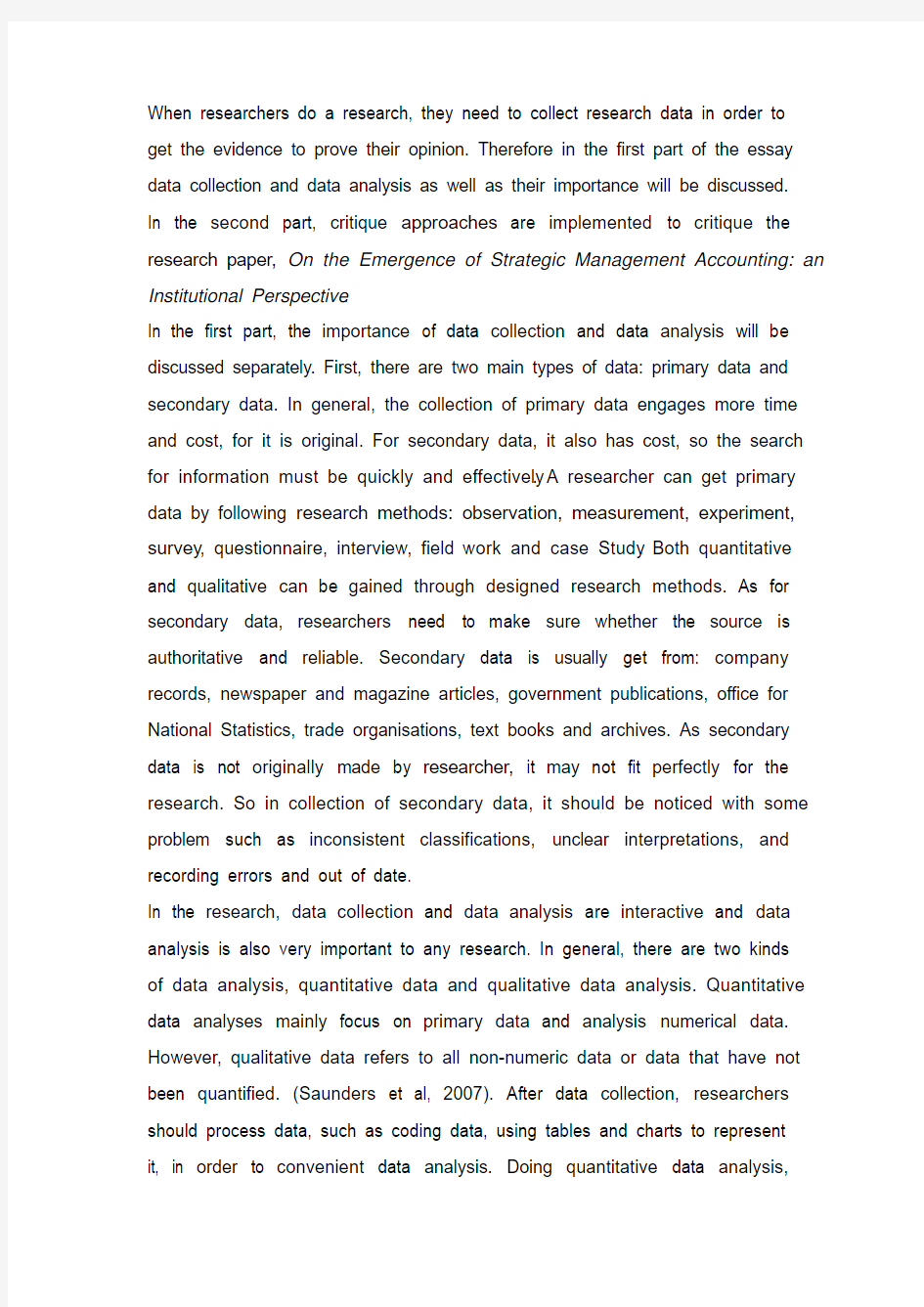Essay5


Essay 5
Advances in Accounting International Finance and Banking
Group Number:
29
Group Members:
Liu Y ajing 1116654
Wang Tuo 1117411
Li Ling 1117413
Xu Ke 1117421
Sun Y an 1117422
When researchers do a research, they need to collect research data in order to get the evidence to prove their opinion. Therefore in the first part of the essay, data collection and data analysis as well as their importance will be discussed. In the second part, critique approaches are implemented to critique the research paper, On the Emergence of Strategic Management Accounting: an Institutional Perspective.
In the first part, the importance of data collection and data analysis will be discussed separately. First, there are two main types of data: primary data and secondary data. In general, the collection of primary data engages more time and cost, for it is original. For secondary data, it also has cost, so the search for information must be quickly and effectively. A researcher can get primary data by following research methods: observation, measurement, experiment, survey, questionnaire, interview, field work and case Study. Both quantitative and qualitative can be gained through designed research methods. As for secondary data, researchers need to make sure whether the source is authoritative and reliable. Secondary data is usually get from: company records, newspaper and magazine articles, government publications, office for National Statistics, trade organisations, text books and archives. As secondary data is not originally made by researcher, it may not fit perfectly for the research. So in collection of secondary data, it should be noticed with some problem such as inconsistent classifications, unclear interpretations, and recording errors and out of date.
In the research, data collection and data analysis are interactive and data analysis is also very important to any research. In general, there are two kinds of data analysis, quantitative data and qualitative data analysis. Quantitative data analyses mainly focus on primary data and analysis numerical data. However, qualitative data refers to all non-numeric data or data that have not been quantified. (Saunders et al, 2007). After data collection, researchers should process data, such as coding data, using tables and charts to represent it, in order to convenient data analysis. Doing quantitative data analysis,
researchers can make statistic analysis, and they can use some analysis tools, such as dispersion, correlation and regression. From quantitative analysis, researchers can know what the data says and get a tendency of how the data going, such as the change of the whole year’s temperature. In other hand, with qualitative data analysis, researchers can summarise, categorise, and compare dif ferent people’s views and opinions. After comparison, researchers can know the similar and differences in the different categories, so as to use the data to prove their own opinions. However, without analysis, data collection will be meaningless and people cannot find out the deeper meaning and the tendency under the data. Instead of that, people may feel confused to the huge amount of data and lose interest in research. In the end, researchers cannot finish the research effectively, and cannot achieve the research objective. So data collection and data analysis should be conducted in each research and they are really important to help researchers to meet research objectives.
In the second part, published paper, On the Emergence of Strategic Management Accounting: an Institutional Perspective, has been critiqued. First, the relationship between previous interviews and the outcomes of this paper is not clear enough. In the research method part, the author explains the recollection of interviews in 2004 to 2006 in detail. All the techniques used in recollection are well-developed in order to ensure the accuracy of the data. However, this research chooses case study as the method. In that case, analysis about the interviews should be closely related to the case study and then related to the outcomes of the article. Unfortunately, reading through the case study, there is no clear related content about those interviews, or analysis about interviews is used in the case study but the author fails to inform the readers between the lines. In short, the research method part is not effective enough to underpin the case study. Expect for above point, another doubtful aspect is about the theoretical framework which used in this paper. According to the authors, Ma and T ayles (2009), the accurate conceptual framework had
not reached to an agreement yet. In the process of research, there must be several essential theories to be the theoretical support. However, even though the authors have chosen the neoinstitutional framework as the foundation, the public have not generally accepted this concept. It is true that writers have made some explanation, in order to prove the reasonability of this framework for strategic management accounting (SMA). But, convincing evidences are not enough when considering this paper. Although the authors stated clearly, readers may be still question about the power of this fundamental framework.
In conclusion, using proper methods to collect data is significant because they can help to improve the effectiveness of researches. Data analysis is important to help people to find out the deeper meaning and the tendency under the data in order to meet research objectives. For a research paper, clear relationship between previous interviews and the outcomes, and appropriate theoretical framework are important to a research paper. Through critique approaches, this research paper is relatively weak in these two aspects.
Reference:
Saunders, M.,Lewis, P., & Thornhill, A. (2007). Analysing qualitative data. In Research Methods for Business Students (4th Ed.pp. 470-517). Edinburgh: Pearson Education Limited.
Ma, Y. & T ayles, M. (2009). On the Emergence of Strategic Management Accounting: an Institutional Perspective. Accounting and Business Research, 39, 473-495
